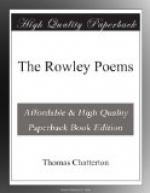5. Plagiarisms from modern authors may in some cases have been introduced by Chatterton but in others they are the commonplaces of poetry.
Against Rowley.
1. No writings or chest deposited in Redcliffe Church are mentioned in Canynge’s Will.
2. The Bristol library was in Chatterton’s time of general access, and Chatterton was introduced to it by Rev. A. Catcott (Warton).
3. Facts about Canynge may be found in his epitaph in Redcliffe Church; and the account of Redcliffe steeple—(which had been destroyed by fire before Chatterton’s time) came from the bottom of an old print published in 1746.
4. The parchments were taken from the bottom of old deeds where a small blank space was usually left—hence their small size.
POEMS,
SUPPOSED TO HAVE BEEN WRITTEN AT BRISTOL,
BY THOMAS ROWLEY, AND OTHERS, IN THE FIFTEENTH CENTURY.
POEMS,
SUPPOSED TO HAVE BEEN WRITTEN
AT BRISTOL, BY THOMAS ROWLEY,
AND OTHERS, IN THE FIFTEENTH
CENTURY. THE THIRD EDITION; TO
WHICH IS ADDED AN APPENDIX,
CONTAINING SOME OBSERVATIONS UPON
THE LANGUAGE OF THESE POEMS;
TENDING TO PROVE, THAT THEY WERE
WRITTEN, NOT BY ANY ANCIENT
AUTHOR, BUT ENTIRELY BY THOMAS
CHATTERTON.
THE CONTENTS OF THIS VOLUME.
The Preface
Introductory Account of the Several Pieces
Advertisement
Eclogue the First
Eclogue the Second
Eclogue the Third
Elinoure and Juga
Verses to Lydgate
Songe to AElla
Lydgate’s Answer
The Tournament
The Dethe of Syr Charles Bawdin
Epistle to Mastre Canynge on AElla
Letter to the dygne M. Canynge
Entroductionne
AElla; a Tragycal Enterlude
Goddwyn; a Tragedie. (A Fragment.)
Englysh Metamorphosis, B.I.
Balade of Charitie
Battle of Hastings, No. 1.
Battle of Hastings, No. 2.
Onn oure Ladies Chyrche
On the same
Epitaph on Robert Canynge
The Storie of William Canynge
On Happienesse, by William Canynge
Onn Johne a Dalbenie, by the same
The Gouler’s Requiem, by the same
The Accounte of W. Canynge’s Feast
GLOSSARY
PREFACE.
The Poems, which make the principal part of this Collection, have for some time excited much curiosity, as the supposed productions of THOMAS ROWLEY, a priest of Bristol, in the reigns of Henry VI. and Edward IV. They are here faithfully printed from the most authentic MSS that could be procured; of which a particular description is given in the Introductory account of the several pieces contained in this volume, subjoined to this Preface. Nothing more therefore seems necessary at present, than to inform the Reader shortly of the manner in which these Poems were first brought to light, and of the authority upon which they are ascribed to the persons whose names they bear.




